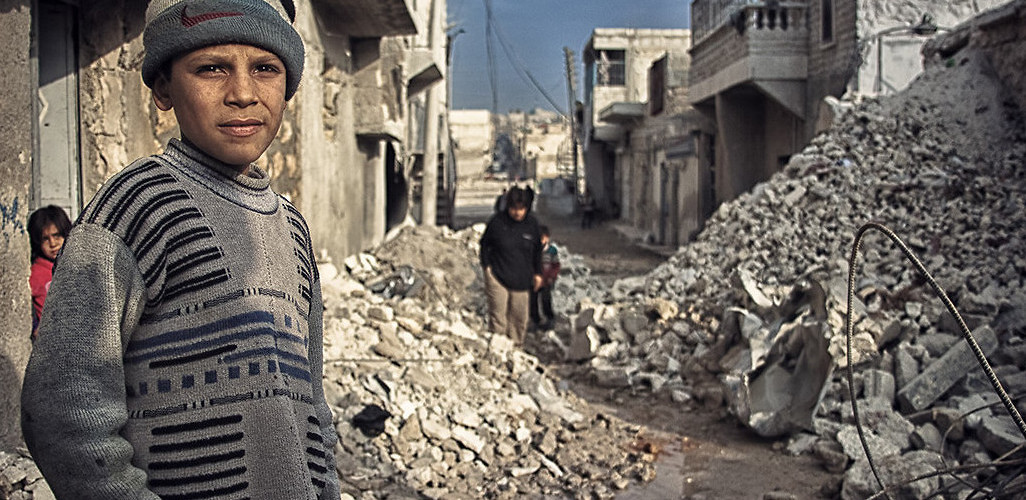A child stands among the rubble of a neighborhood destroyed by the Syrian civil war. Aleppo, Syria, 2013. (Tom Daams/PAX)
Turkey’s ongoing effort to establish a safe zone free of fighters from the so-called Islamic State (ISIS) inside northern Syria, and news that Jordan may be considering a similar initiative, raises questions not only about Syria’s grinding civil war, but also the shape of a post-Assad Syria more generally. In the long term, who will govern this safe zone? Turkish and allied officials remain publicly optimistic that “moderate” members of Syria’s armed opposition will do so, despite continued ISIS incursions.
In regard to both the safe zone and the country at-large, Western governments agonize over the apparent absence of democratic, popular alternatives to Assad’s central government. But such an alternative does exist: democratic local governments have taken root across Syria, under the worst possible conditions. Citizens have established local councils to maintain order, organize protection, and provide basic services. A local government revolution is underway, and it echoes successful examples of statebuilding from the ground-up in fragile and conflict-affected contexts around the world.
Two decades of international support for decentralization of public authority and resources as a central tenet of good governance implicitly acknowledges its vital role in producing a state that can build constructive state-society relations and perform core functions. Yet most international efforts to rebuild state order in fragile and conflict-affected contexts emphasize a “top-down” approach, focusing on central government institutions. Recent research demonstrates that empowered, inclusive local governments can deliver peacebuilding and statebuilding gains in myriad ways. Their contributions should be understood both as those that (1) strengthen social cohesion between citizens and groups of citizens, and those that (2) strengthen the social contract between citizens and state.
Local government can play a vital role in supporting the development of social cohesion, the capacity for collective action that enables societies to mediate conflict before it turns violent. In wartime Bosnia and Herzegovina, for example, courageous local government leaders and civil society in the city of Tuzla united to protect the city’s multiethnic character and resist the onset of violence. Likewise, in the Syrian city of Manbij, the local council has negotiated practical accommodations enabling the community to hold together under regular attack. Endowed with genuine authority and revenue-raising capabilities, local government is an institutional arena where citizens hold dialogue, create mechanisms to promote collective action, and institutionalize negotiation around the common interests of recovery and reconciliation.
The establishment of positive state-society relations is at the heart of the transition from fragility to stability. As local government is the most accessible interface with public authority for most people, it brings formal state institutions into contact with citizens and gives substance to the social contract. It is well-positioned to effectively assess the needs of basic service users, define shared priorities, and mobilize stakeholders. The experiences of Bogotá and Medellín in Colombia demonstrate that inclusive local control over priority-setting and budgets can deliver significant progress in the short-term—even an armed violence reduction “miracle”, against immense odds.
By accelerating service delivery, local government action can tackle root causes of violent conflict, like uneven development and spatial poverty traps, and enable the state to develop visibility, credibility, and legitimacy. Where ethnic inequities or histories of state authoritarianism drive violent conflict, decentralized local governance can fulfil an important conflict mitigation role. Using local government structures to improve basic service provision has been an important feature of consolidating peace in Liberia, Sierra Leone, and Uganda, among other countries.
Finally, the proximity of the local state to citizens tends to make it more sensitive to signals of stress and unrest, and exposes it to a level of scrutiny that promotes responsiveness and accountability. These traits mean local governments are not only more likely to attract and retain the consent and cooperation of populations, but can help spur the broader transformations that define development. One author has gone so far as to argue (persuasively) that Lagos works better than Nigeria—that is, that local government can deliver order and effective services even in the context of a highly dysfunctional nation-state.
Of course, local governments are prone to capture by local and national powerbrokers, suffer crippling and persistent capacity gaps, and may contribute to the destabilizing erosion of central power. Where local governance arrangements replicate and reinforce patterns of exclusion and inequity, they are liable to fail as instruments of peacebuilding and statebuilding. But as there is no evidence that these risks are more salient or acute at the local level than they are at the central, it may be time for international development actors to venture beyond present conventional models of intervention.
Today, Syria’s local councils operate in areas subject to the Assad regime’s barrel bombs, and areas threatened by ISIS terror. In the most fragile of contexts, these embryonic structures provide a democratic forum for citizens and organize the delivery of basic services. The international community has so far failed to adequately support such endogenous democratic processes, though they surely constitute the most promising basis for the sort of legitimate state that might eventually emerge from Syria.
The local councils also point to the powerful potential of bottom-up statebuilding more broadly. Boosting or reforming central government institutions is never enough: a more comprehensive and effective international approach to statebuilding should nurture the mechanisms for building a legitimate, inclusive state up from the local—as well as the vital architecture of multilevel governance that ensures productive relations between different orders of government.
Dion van den Berg is Senior Policy Advisor for Local Government and Peacebuilding, and Michael James Warren is Programme Manager, at PAX.





